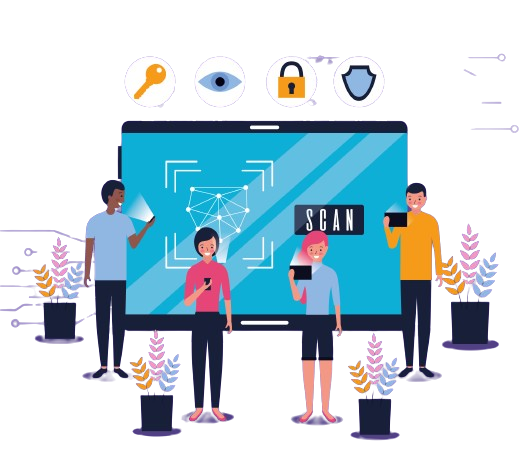
In modern day unexpectedly advancing technological panorama, the importance of cybersecurity can not be overstated. As our global becomes more interconnected through the digital realm, the dangers and threats to our touchy statistics continue to grow. This weblog explores the importance of cybersecurity in safeguarding our statistics, privacy, and typical digital well-being.
What is Cybersecurity, and Why is It Important?
Cybersecurity is the proactive defence mechanism that shields our virtual global from an ever-increasing array of cyber threats. It encompasses a hard and fast of practices, technologies, and processes designed to shield virtual systems, networks, and touchy records from unauthorised entry to data breaches, and malicious attacks. Its importance lies in the essential need to keep the confidentiality, integrity, and availability of data in a technology in which technology permeates every aspect of our lives.
As our dependence on virtual systems intensifies, so does the complexity and sophistication of cyber threats. The importance of cybersecurity isn’t always to thwart malicious actors but additionally to shield touchy facts, which include private facts, monetary statistics, and intellectual belongings. Beyond economic implications, a hit cyberattack can disrupt enterprise operations, tarnish reputations, and erode the consideration of individuals and groups.
In essence, cybersecurity is the frontline defence towards the evolving landscape of cyber threats, ensuring the smooth functioning of digital ecosystems. It is vital for maintaining the agreement of users, safeguarding critical infrastructure, and retaining the integrity of information in a hyper-related international. Embracing strong cybersecurity practices is not just a count of desire; it is vital for the security and resilience of our digital destiny.
The Different Types of Cyber Attacks
In our digitally-pushed era, cyberattacks manifest in numerous bureaucracies, each posing wonderful threats to the safety of our interconnected systems. Phishing assaults, employing misleading emails and messages, target individuals for sensitive facts. Malware, encompassing viruses and ransomware, wreaks havoc by infiltrating systems and compromising records integrity. Man-in-the-middle attacks intercept and manage communication channels, exploiting vulnerabilities.
Denial-of-Service (DoS) and Distributed Denial-of-Service (DDoS) attacks disrupt offerings by overwhelming community sources. SQL injection and Cross-Site Scripting (XSS) attacks take advantage of web utility vulnerabilities, permitting unauthorised access or statistics manipulation. Zero-day exploits target undiscovered software vulnerabilities, giving attackers a bonus. Social engineering leverages mental manipulation for records robbery, while Internet of Things (IoT)-primarily based attacks take advantage of linked devices. Understanding these cyber threats is crucial for implementing effective defences in an ever-evolving virtual panorama.
Understanding Cybersecurity: A Necessity Inside the Digital Age
In the generation of digital transformation, wherein agencies, governments, and individuals closely rely on the era, the idea of cybersecurity will become paramount. Cybersecurity isn’t pretty much defensive computer structures and networks; it is approximately safeguarding our virtual lives. From private records to economic transactions, nearly every component of our everyday sports has a digital footprint, making us susceptible to cyber threats.
The Evolving Nature of Cyber Threats
Cyber threats are dynamic and constantly evolving. From conventional viruses and malware to state-of-the-art phishing assaults and ransomware, the strategies employed by means of cybercriminals are becoming more superior. The interconnectedness of devices within the Internet of Things (IoT) technology adds another layer of complexity, expanding the ability to attack the floor for malicious actors.
Protecting Sensitive Data
One of the number one importance of cybersecurity is to protect sensitive statistics from unauthorised entry. Whether it is private statistics, financial facts, or intellectual assets, unauthorised access can result in devastating results. Cybersecurity measures, inclusive of encryption and stable authentication protocols, play a crucial position in making sure that the handiest legal people have the right of entry to too touchy facts.
Preserving Privacy within the Digital World
Privacy is a fundamental right that is increasingly at risk in the digital age. Cybersecurity measures not only protect touchy facts but also contribute to preserving our privacy online. With the constant danger of data breaches and online surveillance, individuals should be proactive in adopting cybersecurity practices to preserve control over their non-public data.
Securing Business Operations
For groups, the impact of a cybersecurity breach may be catastrophic. Beyond the economic losses, a breach can lead to reputational damage and loss of purchaser trust. Implementing robust cybersecurity measures is not just a count of compliance; it’s a strategic vital for maintaining the resilience and continuity of business operations.
Cybersecurity Awareness: A Collective Responsibility
While advanced technologies and security equipment are critical components of cybersecurity outsourcing, human attention and education are equally crucial. Phishing attacks, for instance, often target people via misleading emails or messages. Educating customers about the signs and symptoms of an ability hazard and selling cyber hygiene practices are vital elements in the collective effort to beautify cybersecurity.
Government Initiatives and Regulations
Governments around the sector understand the importance of cybersecurity in national protection and the safety of citizens. Consequently, many nations have carried out cybersecurity projects and regulations to ensure the resilience of their digital infrastructure. Compliance with these policies no longer most effectively enables warding off prison effects but additionally strengthens typical cybersecurity.
The Future of Cybersecurity: Emerging Technologies
As cyber threats keep conforming, so does the sector of cybersecurity. Emerging technologies, including artificial intelligence (AI) and system learning, are being increasingly applied to detect and respond to threats in actual time. The integration of these technologies into cybersecurity frameworks is paving the way for an extra proactive and adaptive method of digital protection.
Conclusion
In the end, the importance of cybersecurity extends a long way past the area of the era. It is a fundamental factor in maintaining our virtual manner of lifestyles. As we continue to embody innovation and connectivity, the want for robust cybersecurity measures becomes non-negotiable. By expertise in the evolving nature of cyber threats, imposing proactive safety features, and fostering a culture of cybersecurity consciousness, we will collectively contribute to safeguarding our virtual future.
You May Also Like To Read: Cybersecurity Outsourcing: Principles and Trust




Leave a Comment